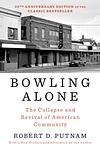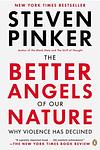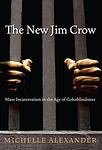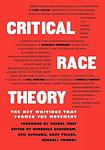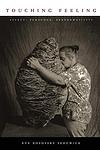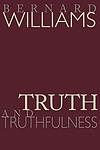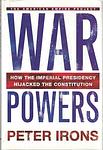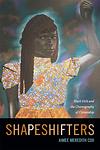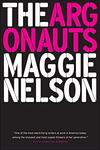The New Canon: What’s the Most Influential Book of the Past 20 Years?
This is one of the 286 lists we use to generate our main The Greatest Books list.
-
Bowling Alone by Robert D. Putnam
This book delves into the decline of social capital in the United States over the latter half of the 20th century, illustrating how Americans have become increasingly disconnected from their families, friends, neighbors, and democratic structures. It explores the consequences of this disengagement, arguing that the fabric of American social life has frayed significantly, with civic, social, and political participation diminishing. Through a comprehensive analysis of societal trends, the author demonstrates how this shift away from communal activities towards individual pursuits has profound implications for the health, happiness, and stability of society.
-
The Better Angels Of Our Nature by Steven Pinker
This book presents a comprehensive analysis of violence throughout human history, arguing that, contrary to popular belief, we are living in the most peaceful era ever. The author uses a wealth of data to demonstrate how the rates of violence, from homicide to war, have decreased over centuries due to various social, cultural, and political developments. By examining the forces he believes have led to this decline, such as the spread of government, trade, and the influence of enlightenment thinking, the book offers an optimistic view of humanity's ability to reduce violence through reason and empathy, suggesting that our better angels are indeed winning the battle against our inner demons.
-
The New Jim Crow by Michelle Alexander
"The New Jim Crow" is a thought-provoking and eye-opening book that examines the deeply ingrained racial bias within the American criminal justice system. Drawing on extensive research and personal anecdotes, the author explores how the War on Drugs has disproportionately targeted and marginalized Black communities, leading to a modern-day system of racial control and oppression. This powerful critique challenges readers to confront the systemic racism that continues to perpetuate inequality and injustice in the United States.
-
The History Manifesto by Johanna Hanink
"The History Manifesto" is a thought-provoking exploration into the role of history and historians in addressing the long-term social, political, and environmental challenges facing the world today. It argues for a return to longue durée historical analysis, emphasizing the importance of understanding the deep roots of current issues to inform policy and public debate. The book critiques the trend towards short-termism in both historical research and contemporary policymaking, advocating for a broader, more inclusive approach to history that can offer valuable insights into the complex, interconnected problems of the 21st century. Through its compelling case for the relevance of history in shaping a better future, it challenges historians to think big and reasserts the significance of their work in the public sphere.
-
Freaks Of Fortune by Jonathan Levy
This book delves into the historical transformation of risk in American society, tracing how the once collective responsibility for misfortune evolved into an individualized obligation to manage uncertainty. It explores the emergence of insurance, corporate risk management, and personal responsibility as central to the American economic life, illustrating how these developments have shaped the modern capitalist society. Through a detailed examination of legal, cultural, and economic changes, the narrative reveals how the pursuit of wealth and the fear of financial ruin have driven Americans to a perpetual quest for security, fundamentally altering their relationship with the future and fortune.
-
What Art Is by Arthur C. Danto
This book explores the philosophy and definition of art, challenging traditional views and proposing a new framework for understanding what art truly is. The author argues that art is not defined by its aesthetic qualities or by the intentions of the artist, but rather by the context and the role of theories and interpretations in shaping our perception of what art is. Through a series of engaging discussions and analyses of historical and contemporary artworks, the book invites readers to reconsider their assumptions about art and its value, suggesting that art's essence lies in its ability to embody meanings and ideas that transcend its physical form.
-
Homo Deus by Yuval Noah Harari
This book explores the future of humankind, building upon the foundation laid by its exploration of our past. It delves into the potential paths humanity might take as technological advancements and artificial intelligence begin to challenge the very essence of what it means to be human. The narrative posits that as we conquer famine, war, and plague, our focus shifts towards achieving happiness, immortality, and divinity, raising profound questions about our future roles and values in a world where machines and algorithms might outperform us in thinking, making decisions, and understanding the universe. Through a blend of philosophy, history, and future-gazing, the book invites readers to consider the implications of such a future, both exhilarating and daunting.
-
Killing The Black Body by Dorothy E. Roberts
This book is a critical examination of the ways in which the reproductive rights of African American women have been controlled and violated throughout American history. It delves into the intersection of race, gender, and class, revealing how black women's bodies have been subjected to coercive policies and practices, from the era of slavery to contemporary issues of forced sterilization and unequal access to reproductive healthcare. The work challenges readers to confront the systemic racism embedded in America's reproductive policies and to recognize the ongoing struggle for autonomy and justice faced by black women in the realm of reproductive freedom.
-
The Feeling Of What Happens by Antonio Damasio
This book delves into the complex interplay between emotion, consciousness, and the human brain, offering a groundbreaking perspective on how our feelings shape our experiences of the world. The author, a renowned neuroscientist, explores the biological roots of consciousness and argues that our emotions are a crucial component of the self, playing a fundamental role in the way we perceive and navigate our surroundings. Through a combination of scientific research and philosophical inquiry, the text provides a compelling examination of the essence of human awareness, suggesting that the feeling of what happens in our minds is central to our identity and understanding of life.
-
Paying For The Party by Laura Hamilton, Elizabeth A. Armstrong
This book provides an in-depth examination of how the social and academic life at a large public university in the United States impacts young women from different socioeconomic backgrounds. Through a longitudinal study, the authors explore how the university's "party pathway" facilitates the success of affluent students while marginalizing those from less privileged backgrounds. The book highlights the role of social class in shaping educational outcomes and experiences, revealing the hidden curriculum of higher education that prioritizes social over academic engagement. It offers a critical look at the college experience, questioning the broader implications for social mobility and equality in an ostensibly meritocratic system.
-
A Brief History Of Neoliberalism by David Harvey
This book provides a critical examination of neoliberalism, tracing its origins and development from the late 20th century to its pervasive influence on global economics and politics. The author argues that neoliberalism, a doctrine advocating for free markets, deregulation, and reduction in government spending, has concentrated wealth and power in the hands of a few, leading to increased social inequality and environmental degradation. Through a detailed analysis of various countries' experiences, the book highlights the consequences of neoliberal policies and calls for a reevaluation of the current economic paradigm to address its shortcomings and create a more equitable and sustainable future.
-
Critical Race Theory by Kimberle Crenshaw, Neil Gotanda, Gary Peller, Kendall Thomas
This book is a foundational compilation that delves into the complexities of race, law, and power through the lens of Critical Race Theory (CRT). It brings together a diverse range of essays and articles by leading scholars who explore the ways in which racism is embedded within the legal fabric and structure of the United States. The work challenges traditional approaches to civil rights, critiques liberal legalism, and examines the role of social and cultural narratives in shaping racial perceptions and legal outcomes. By highlighting the intersectionality of race, gender, and class, the book offers a profound critique of racial justice issues and proposes transformative strategies for addressing systemic inequalities.
-
The Restless Clock by Jessica Riskin
This book delves into the historical debate over the nature of life and the mechanistic view of living beings, tracing its evolution from the early modern period to the present. It challenges the long-standing notion that machines and organisms are fundamentally different, arguing instead for a more nuanced understanding of the relationship between mechanics and life. Through a detailed examination of philosophical, scientific, and technological developments, the work explores how ideas about automata and mechanical models have influenced and been influenced by evolving concepts of nature, life, and intelligence. The narrative weaves together stories of inventors, philosophers, and scientists who have contributed to the development of this complex discourse, offering a compelling argument for rethinking the boundaries between the animate and the inanimate.
-
Touching Feeling by Eve Kosofsky Sedgwick
This book delves into the complexities of emotion, affect, and performativity within the realm of queer theory and literary analysis. It challenges traditional boundaries between disciplines, advocating for a more nuanced understanding of how texts and emotions interact. Through a series of essays, the work explores various aspects of affect, including shame, love, and pedagogy, and how these emotions are experienced and represented. The author employs an interdisciplinary approach, drawing from psychology, philosophy, and critical theory, to argue for the importance of affect in shaping our understanding of identity, culture, and social relations. This insightful exploration encourages readers to reconsider the role of feelings in the critical analysis and the ways in which emotions are deeply intertwined with the politics of queer identity.
-
Ella Baker And The Black Freedom Movement by Barbara Ransby
This book is a comprehensive biography that chronicles the life and influence of a prominent civil rights activist who played a pivotal role in some of the most influential organizations of her time, including the NAACP, Martin Luther King Jr.'s Southern Christian Leadership Conference, and the Student Nonviolent Coordinating Committee. It delves into her commitment to grassroots organizing and participatory democracy, showcasing her belief in the power of the people to instigate social change. The narrative highlights her behind-the-scenes work, her emphasis on collective leadership, and her dedication to fighting racial and economic injustice, making a strong case for her as one of the most important, yet often overlooked, leaders of the civil rights movement.
-
Truth And Truthfulness by Bernard Williams
This philosophical work explores the importance of truth and the practice of truthfulness in society, arguing against the skepticism and relativism that question the value and possibility of truth. The author delves into the concepts of accuracy and sincerity, which he identifies as the two basic virtues of truth, and examines how these virtues are essential to human practices and institutions. Through a blend of historical analysis and philosophical inquiry, the book defends the indispensability of truth and truthfulness, while also acknowledging the challenges and complexities involved in upholding these ideals in the modern world. The author's insightful analysis aims to reconcile the demands of truth with the necessities of social cohesion, offering a compelling case for why truth and truthfulness matter profoundly in both personal and public life.
-
War Powers by Peter Irons
This book provides a comprehensive examination of the constitutional and historical debates surrounding the powers of war in the United States, focusing on the contentious issue of whether the President or Congress has the ultimate authority to declare and conduct war. Through a detailed analysis of key events, legal battles, and pivotal Supreme Court cases, the author explores how the balance of power has shifted over time, often expanding executive power at the expense of legislative oversight. The narrative critically assesses the implications of these shifts for American democracy and international relations, offering insights into the ongoing struggle to define the limits of presidential war powers in the context of both historical and contemporary geopolitical challenges.
-
Age Of Fracture by Daniel T. Rodgers
This book delves into the late 20th century in America, a period marked by profound ideological and social fragmentation. It explores how the collective certainties that had defined the post-World War II era began to unravel, giving way to a more fragmented, individualistic, and market-driven society. Through a detailed examination of political, social, and intellectual trends, the narrative uncovers how ideas about power, gender, race, and the economy transformed. The author argues that this shift towards a more fractured society has had lasting impacts on American identity, culture, and politics, fundamentally altering the way Americans understand and engage with the world around them.
-
Shapeshifters by Aimee Cox
This book offers a compelling exploration into the lives of young Black women in Detroit as they navigate the complexities of poverty, urban life, and the expectations placed upon them. Through ethnographic research and personal narratives, the author delves into how these women employ creativity and resilience to transform their circumstances and challenge the societal structures that aim to define them. By examining their experiences in schools, the juvenile justice system, and various community settings, the book reveals the transformative power of self-definition and the importance of community in fostering change. It is a testament to the strength and ingenuity of young Black women in the face of systemic marginalization.
-
The Argonauts by Maggie Nelson
"The Argonauts" is a genre-bending memoir that chronicles the author's romantic relationship with her fluidly gendered partner, their journey to become parents, and their experiences with queer family-making. The narrative intertwines personal anecdotes with critical theories on gender, sexuality, and identity, challenging traditional notions of family, motherhood, and love. It offers a powerful exploration of desire, limitations, and the possibilities of language, pushing the boundaries of what memoirs can do and be.
The Chronicle of Higher Education, 20 Books
The Chronicle of Higher Education, which is a newspaper and website that presents news, information, and jobs for college and university faculty and student affairs professional invited scholars from across the academy to tell what they saw as the most influential book published in the past 20 years. (Some respondents named books slightly outside our time frame, but were included anyway.) They asked them to select books — academic or not, but written by scholars — from within or outside their own fields. It was up to the respondents to define “influential.”
Added 22 days ago.
This list has a weight of 52%. To learn more about what this means please visit the Rankings page.
Here is a list of what is decreasing the importance of this list:
- List: only covers 25 years
- Voters: 6-10 people voted
- List: criteria is not just "best/favorite"
If you think this is incorrect please e-mail us at [email protected].
